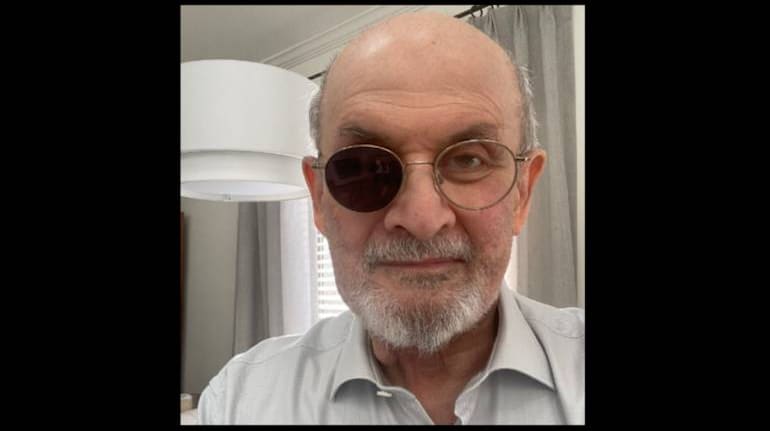



Celebrated author Salman Rushdie said he feels lucky to have survived last year’s brutal stabbing at a literary event in the US that left him blinded in one eye. Rushdie, 75, was blinded in his right eye and his left hand was badly injured after a man stabbed him onstage during a lecture in New York state last August.
The Booker Prize-winning author of “Midnight’s Children” and “The Satanic Verses”, in his first interview nearly six months since the attack, said he has struggled to write and has suffered nightmares.
Rushdie also shared a tweet by the New Yorker which has a photo of him. “The photo in @NewYorker is dramatic and powerful but this, more prosaically, is what I actually look like,” he said in a now-deleted tweet.
Rushdie shared the photo again in another tweet.
This photo seems to have vanished from my tweets. Here it is again, just for the record. pic.twitter.com/nqt34gIuRW— Salman Rushdie (@SalmanRushdie) February 7, 2023
"All I've seen is his idiotic interview in the New York Post," Rushdie told the New Yorker about his attacker. "Which only an idiot would do."
Rushdie said he feels no anger towards his 24-year-old attacker.
“I’ve tried very hard over these years to avoid recrimination and bitterness,” he said. “I just think it’s not a good look. One of the ways I’ve dealt with this whole thing is to look forward and not backwards. What happens tomorrow is more important than what happened yesterday.”
Salman Rushdie, who was born in Mumbai, won international acclaim for his 1981 book “Midnight's Children”.
On the health front, he said he is taking hand therapy after the attack.
“The big injuries are healed, essentially," Rushdie said.
"I have feeling in my thumb and index finger and in the bottom half of the palm. I’m doing a lot of hand therapy, and I’m told that I’m doing very well,” he told the New Yorker's David Remnick ahead of the release of his latest novel, "Victory City".
But the following years brought him trouble and turmoil. His 1988 book “The Satanic Verses”, condemned by many Muslims as blasphemous, caused unrest around the world. Ayatollah Khomeini, then the Supreme leader of Iran, had issued a fatwa or decree, calling for Rushdie to be killed. The fatwa forced Rushdie to go into hiding for a decade in the United Kingdom.
Discover the latest Business News, Sensex, and Nifty updates. Obtain Personal Finance insights, tax queries, and expert opinions on Moneycontrol or download the Moneycontrol App to stay updated!
Find the best of Al News in one place, specially curated for you every weekend.
Stay on top of the latest tech trends and biggest startup news.